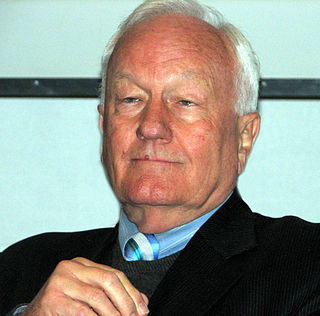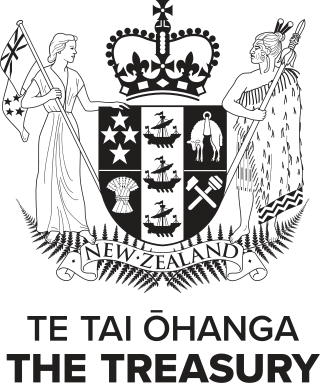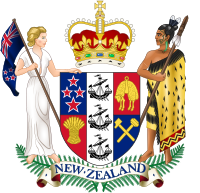
Sir Simon William English is a New Zealand former politician who served as the 39th prime minister of New Zealand from 2016 to 2017 and leader of the National Party from 2001 to 2003 and 2016 to 2018. He had previously served as the 17th deputy prime minister of New Zealand and minister of finance from 2008 to 2016 under John Key and the Fifth National Government.

Sir Roger Owen Douglas is a retired New Zealand politician, economist and accountant who served as a minister in two Labour governments. He is most recognised for his key involvement in New Zealand's radical economic restructuring in the 1980s, when the Fourth Labour Government's economic policy became known as "Rogernomics", which implemented neoliberal economic policies.

Sir Michael John Cullen was a New Zealand politician. He was a Member of the New Zealand House of Representatives from 1981 to 2009, the Deputy Leader of the New Zealand Labour Party from 1996 to 2008 and a senior minister in the Fifth Labour Government from 1999 to 2008, serving as Deputy Prime Minister, Minister of Finance, and Attorney-General.

Ruthanasia, a portmanteau of "Ruth" and "euthanasia", is the pejorative name given to the period of free-market policies conducted during the first term of the fourth National government in New Zealand, from 1990 to 1993. As the first period of reform from 1984 to 1990 was known as Rogernomics after the Labour Party Minister of Finance, Roger Douglas, so the second period became known as "Ruthanasia", after the National Party's Minister of Finance, Ruth Richardson.

Ruth Margaret Richardson is a retired New Zealand politician of the National Party who served as Minister of Finance from 1990 to 1993. Her 1991 budget, which she dubbed the "Mother of all Budgets", formed the catalyst for her party's economic reforms known in the media as "Ruthanasia".

David Francis Caygill is a former New Zealand politician. He was born and raised in Christchurch. He entered politics in 1971 as Christchurch's youngest city councillor at the age of 22. He served as a Member of Parliament (MP) from 1978 to 1996, representing the Labour Party. A supporter of Rogernomics, he served as Minister of Finance between 1988 and 1990. From 2010 to 2019, he was one of the government-appointed commissioners at Environment Canterbury.

Maryan Street is a New Zealand unionist, academic and former politician. She was president of the New Zealand Labour Party from 1993 to 1995 and a Labour Party list member of the New Zealand House of Representatives from 2005 until 2014.

Jonathan David Coleman is a retired New Zealand politician and medical practitioner, who most recently served as Minister of Health and for Sport and Recreation under the Fifth National Government. Coleman also served as Minister of Defence and Immigration within the first two terms of that government, and represented the parliamentary constituency Northcote for the National Party from 2005 to 2018.

The New Zealand Treasury is the central public service department of New Zealand charged with advising the Government on economic policy, assisting with improving the performance of New Zealand's economy, and managing financial resources. The Minister responsible for the Treasury is the Minister of Finance of New Zealand; however, from 1996 to 2002, there existed a more specific position of Treasurer of New Zealand. The role was created for Winston Peters by the Fourth National Government under Jim Bolger after the 1996 election, and abolished by Helen Clark’s government in 2002.

The New Zealand budget for fiscal year 2006–2007 was presented to the New Zealand House of Representatives by Finance Minister Dr Michael Cullen on 18 May 2006.

Steven Leonard Joyce is a New Zealand former politician, who entered the New Zealand House of Representatives in 2008 as a member of the New Zealand National Party. As a broadcasting entrepreneur with RadioWorks, he was a millionaire before he entered politics. In 2008 he became Minister of Transport and Minister for Communications and Information Technology. He later became Minister of Science and Innovation, and then served as Minister of Finance and Minister for Infrastructure.

The New Zealand budget for fiscal year 2012–2013 was presented to the New Zealand House of Representatives by Finance Minister Bill English on 24 May 2012.

The New Zealand budget for fiscal year 2010-2011 was presented to the New Zealand House of Representatives by Finance Minister Bill English on 20 May 2010.

The New Zealand budget for fiscal year 2011-2012 was presented to the New Zealand House of Representatives by Finance Minister Bill English on 19 May 2011.

The New Zealand budget for fiscal year 2009-2010 was presented to the New Zealand House of Representatives by Finance Minister Bill English on 28 May 2009.

The New Zealand budget for fiscal year 2008-2009 was presented to the New Zealand House of Representatives by Finance Minister Dr Michael Cullen on 22 May 2008.

The New Zealand budget for fiscal year 2015/16 was presented to the New Zealand House of Representatives by Finance Minister Bill English on 21 May 2015. It was the seventh budget English presented as Minister of Finance.

The New Zealand budget for fiscal year 2016/17 was presented to the New Zealand House of Representatives by Finance Minister Bill English on 26 May 2016. It was the eighth budget English has presented as Minister of Finance, and the eighth budget of the Fifth National Government.

The New Zealand budget for fiscal year 2017/18 was presented to the New Zealand House of Representatives by Finance Minister Steven Joyce on 25 May 2017. It was the ninth budget of the Fifth National Government, and the first presented by Joyce in his role as Minister of Finance. This was the last budget presented by the Fifth National government which was defeated at the 2017 general election.

Nicola Valentine Willis is a New Zealand politician with a background in English literature and journalism. She is currently deputy leader of the National Party and in November 2023 was appointed minister of Finance in a coalition government with ACT and New Zealand First. Willis entered the New Zealand Parliament in 2018, when she inherited Steven Joyce's seat in Parliament as the next on the party list after his retirement from politics.












